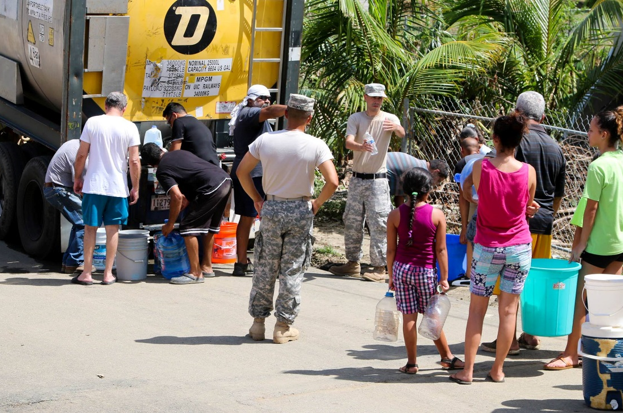For Gabriela Anglada, who was born and raised in Puerto Rico, moving to College Park last year to attend the University of Maryland was a culture shock.
While the sophomore enrolled in letters and sciences had just began adjusting to being away from home, the recent devastation of her island by Hurricane Maria left her heartbroken, she said. The widespread power outages prevented Anglada from being able to talk to her family for more than a week.
“[I get] voicemail after voicemail after voicemail,” Anglada said. “You just feel completely isolated.”
Anglada jumped at the opportunity to lead and coordinate fundraising and awareness campaigns at this university so she could help allocate resources for those affected by Maria’s destruction.
[Read more: UMD students and faculty are coming together to help Hurricane Harvey victims]
Hurricane Maria knocked out almost all of the island’s electrical grid, leaving most of its 3.4 million residents without power, The Washington Post reported. Widespread flooding, property damage and downed trees have created an environment not expected to fully improve for months.
Anglada and Junellie Gonzalez Quiles, a senior astronomy and physics major, are working with Students with Puerto Rico, a campaign started by three University of Pennsylvania students who have reached out to campuses across the country to raise money for the crisis. While the campaign began as a locally-promoted GoFundMe on Sept. 20, it has since spread to more than 80 colleges across the country.
Students with Puerto Rico raised more than $100,000 in the past week, Anglada said, including a $20,000 donation from late-night talk show host Jimmy Fallon.
The organization donates all its funds to Unidos Por Puerto Rico, an initiative brought forth by the island’s first lady, Beatriz Areizaga, in collaboration with large private sector businesses such as Coca-Cola, AT&T and Microsoft to provide aid to those affected by the recent disaster.
At this university, Anglada and Gonzalez Quiles said they’ve raised about $300 after a week of on-campus fundraising and donations. Their goal is to raise $1,000 by the end of this week.
Anglada and Gonzalez Quiles will have bake sales, donation drives and other events in the coming weeks. Meanwhile, the two plan to continue using Venmo to ask for donations for the island, which declared bankruptcy in May and is more than $70 billion in debt.
Similar to Anglada, Gonzalez Quiles said she left her whole life in Puerto Rico to attend this university. While her parents and sister moved with her to the United States, her grandparents and entire extended family still live on the island.
The past week was so emotionally difficult that she “couldn’t function,” Gonzalez Quiles said, adding she continually asked her professors for permission to have her phone out in class in hopes she’d get a call from her family.
“Seeing pictures of where I grew up, my home, being destroyed, it’s certainly something that really touches your heart, and that’s why I wanted to start fundraising,” Gonzalez Quiles said.
[Read more: UMD emergency manager: “We are well-prepared” for potential hurricane]
Both Anglada and Gonzalez Quiles said they feel the level of awareness for the crisis in Puerto Rico is not as high as it should be among Americans who live in America, even though Puerto Ricans are considered U.S. citizens too. Some students just don’t understand Maria’s full effects, Gonzalez Quiles said.
“They somehow feel like they don’t relate, because in their minds, we’re not American citizens, even though we are,” she said. “That’s something that should be tackled … it’s definitely affecting how people view people in Puerto Rico in need.”
Checka Lapierre, a sophomore English major, said she is personally familiar with the events unfolding in Puerto Rico, but knows many people who are not.
“With any natural disaster that you’re not literally, directly affected by, you’re detached,” Lapierre said. “People care, but they don’t understand.”
Students with Puerto Rico is hoping to use its fundraising efforts to simultaneously educate the public about the relationship between Puerto Rico and the United States.
“We were helpless when we saw these events happen” but refuse to lose hope, Anglada said. “We’re in desperate need and time is not in our favor … [but] I always believe in my people.”



